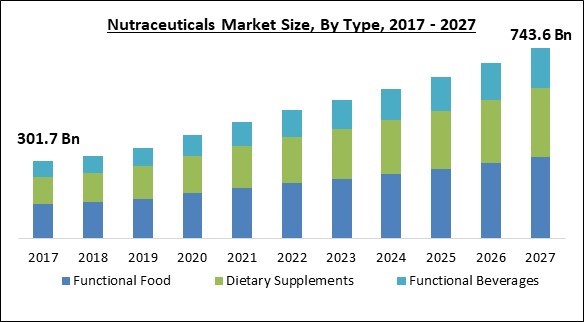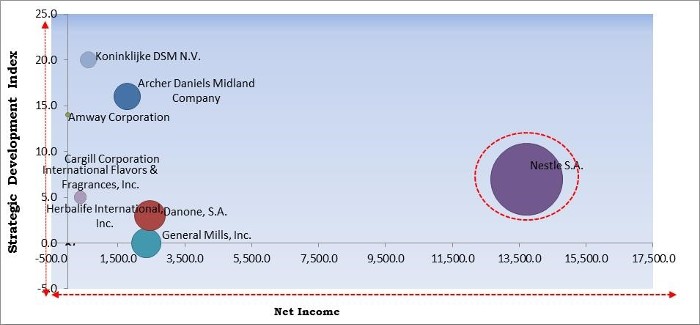The Global Nutraceuticals Market size is expected to reach $743.6 billion by 2027, rising at a market growth of 8.6% CAGR during the forecast period.
Nutraceuticals are food-based supplements that can also be used for therapeutic purposes. Because they are manufactured from food materials and extracts, these products are also known as bioceuticals. Nutraceuticals products are available in a variety of forms and are utilized for a wide range of purposes. These products are unregulated in several parts of the globe because they are considered food supplements or additives. The demand for nutraceuticals is steadily expanding. The key cause for the rise in demand for nutraceuticals is a growing knowledge of the health advantages associated with the use of nutraceuticals and nutraceutical supplements.
Furthermore, a growth in athletes' participation in sports at the national and international levels is predicted to enhance demand for functional beverages. The functional food industry is being driven by a growing urbanized population, increased spending on health-related products, and an increase in cardiovascular, chronic, and obesity-related diseases. Functional foods are high in omega fatty acids, which aid in weight management and blood circulation control in the body.
Over the forecast period, rising healthcare expenses, along with an increasing worldwide elderly population, are expected to aid the overall nutraceuticals market growth. Consumers have a very favorable attitude toward functional foods, owing to the additional health and wellness benefits that these products provide. The overall growth has been assisted by the rising older population; rising healthcare costs, changing lifestyles, food innovation, and expectations regarding higher prices.
Because starting a Nutraceuticals production business is relatively simple, the Nutraceuticals market has a strong presence of regional companies. Many types of Nutraceuticals have gained a lot of attention in recent years, resulting in a flood of low-quality Nutraceuticals items on the market. The correct type of nutraceuticals product has no negative effects on the consumers' health.

The demand for nutritional supplements and functional foods has risen dramatically in the wake of the COVID-19 outbreak. Over the last year, immune-boosting supplements have become more mainstream, resulting in major changes in purchasing patterns and consumer behaviour. Furthermore, following the COVID-19 pandemic, various preventive healthcare measures like nutritional supplements are becoming popular. As a result, the worldwide COVID-19 pandemic has cleared the road for nutraceuticals to establish a prominent presence in the market.
The COVID-19 pandemic has had a significant and positive impact on the global economy. According to estimates, demand for products that promise to improve health and immunity has skyrocketed. The widespread dissemination of medical advice encouraging people to include functional foods and dietary supplements into their everyday lives to help their immune systems considerably adds to the widespread use of these goods.
Increased consumer awareness of the benefits of taking health supplements, expanding awareness of preventative healthcare measures, and a growing number of affluent and health-conscious customers are driving the industry's rise.
According to a survey performed by the International Food Information Council (IFIC), 87 percent of consumers in the United States agreed that certain foods provide health advantages beyond their basic nutrition in 2009, and 89 percent agreed in 2011. This reflects the growing interest among consumers in learning more about functional and fortified foods. Health issues are rising, and health awareness is expanding among Canadian consumers, according to the Business Development Bank of Canada in 2013, and will continue to accelerate as the aging population, with 25% of the people above the age of 65 by 2031. According to a study done by the United Nations Department of Economic and Social Affairs in 2013, the ageing population, together with rising chronic disease rates, has resulted in an increase in chronic disease incidences.
Customized medical technologies are quickly being implemented by nutraceutical ingredient manufacturers in order to create better-suited and tailored end products for consumers. Consumer goods firms are progressively gathering data to enable accurate analysis of purchasing behavior and lifestyle in order to present customers with customized solutions based on their preferences. For example, Tesco announced in 2013 that it would utilize its Clubcard data to track numerous chronic ailments that consumers are aware of in order to provide customized solutions to enhance healthier eating habits. This information not only helps consumer companies develop individualized nutritional recommendations, but it also helps pharmaceutical companies forge important collaborations to assist personalize over-the-counter supplements.
Functional foods and beverages, pharmaceuticals, animal nutrition, and personal care products are just a few of the applications for nutraceutical components. The addition of nutraceutical ingredients to food and beverage products, feed products, pharmaceuticals, and personal care items, however, raises the pricing of these end products. As a result, lesser acceptance of such products occurs, which would restrict the adoption of the nutraceutical products across the world. Since consumers have been more careful about eating the right foods, there has been a rise in demand for healthier alternatives to consumables in recent years.
When nutraceutical components are added to any type of food or beverage product, functional food and beverages are created, which provide a health benefit in some way. There are many people with medium or low-income level, who would restrict themselves from the adoption of such nutrient-enriched products and hence, hindering the growth of the nutraceuticals market over the forecast period.

Based on Type, the market is segmented into Functional Food, Dietary Supplements, and Functional Beverages. Further, on the basis of Functional food, the market is segmented into Vitamins, Minerals, Carotenoids, Dietary Fibers, Prebiotics & Probiotics, Fatty Acids, and Others. Based on Dietary Supplements, the market is segmented into Vitamins & Minerals, Proteins & Amino Acids, Fibers & Specialty Carbohydrates, Botanicals, Omega Fatty Acids & Others. Based on Functional Beverages, the market is segmented into Energy & Sports Drinks, Functional Juices, and Others. The functional beverages segment witnessed a promising revenue share in the nutraceuticals market in 2020. This growth is attributed to various factors like rise in popularity of beverages containing nutrient benefits. In addition, since beverages are easy to digest, many people opt for it and hence, contribute to the growth of the segment.
Based on Sales Channel, the market is segmented into Pharmacy, Specialty Stores, Hypermarket/Supermarket, and Online Channels. Pharmacy segment garnered the largest revenue share in the nutraceuticals market in 2020. It is owing to the high reliability and authenticity of the products, these stores provide. Since pharmacies obtain government license, consumers tend to trust more on these stores, which would escalate the growth of this segment.
Based on Form, the market is segmented into Capsule & Tablets, Liquid, Powder, and Others. The Liquid segment acquired a substantial revenue share in the nutraceuticals market in 2020. Since liquid form of nutraceuticals can be easily added to the daily diet of the people, the demand for liquid nutraceuticals would increase. In addition, nutraceutical drinks are gaining more momentum as people are looking forward for the alternative of carbonated drinks.
| Report Attribute | Details |
|---|---|
| Market size value in 2020 | USD 403.2 Billion |
| Market size forecast in 2027 | USD 743.6 Billion |
| Base Year | 2020 |
| Historical Period | 2017 to 2019 |
| Forecast Period | 2021 to 2027 |
| Revenue Growth Rate | CAGR of 8.6% from 2021 to 2027 |
| Number of Pages | 395 |
| Number of Tables | 703 |
| Report coverage | Market Trends, Revenue Estimation and Forecast, Segmentation Analysis, Regional and Country Breakdown, Competitive Landscape, Companies Strategic Developments, Company Profiling |
| Segments covered | Type, Sales Channel, Form, Region |
| Country scope | US, Canada, Mexico, Germany, UK, France, Russia, Spain, Italy, China, Japan, India, South Korea, Singapore, Malaysia, Brazil, Argentina, UAE, Saudi Arabia, South Africa, Nigeria |
| Growth Drivers |
|
| Restraints |
|
Based on Regions, the market is segmented into North America, Europe, Asia Pacific, and Latin America, Middle East & Africa. Asia Pacific emerged as the leading region in the nutraceuticals market with the highest revenue share in 2020. The primary drivers of the regional market are rising consumer health concerns and increased knowledge of nutraceuticals. Also, the nutraceutical industry's rise in Asia Pacific has been aided by an ageing population, changing healthcare expenditure patterns, and changing lifestyles. The expanding trend of fortifying foods with nutraceutical goods, on the other hand, is expected to provide a considerable potential opportunity for this industry.
Free Valuable Insights: Global Nutraceuticals Market size to reach USD 743.6 Billion by 2027

The major strategies followed by the market participants are Product Launches. Based on the Analysis presented in the Cardinal matrix; Nestle S.A.is the major forerunners in the Nutraceuticals Market. Companies such as General Mills, Inc., Danone, S.A. and Koninklijke DSM N.V. are some of the key innovators in the Market.
The market research report covers the analysis of key stake holders of the market. Key companies profiled in the report include Nestle S.A., General Mills, Inc., Archer Daniels Midland Company, Danone, S.A., Koninklijke DSM N.V., International Flavors & Fragrances, Inc., Herbalife International, Inc., The Hain Celestial Group, Inc., Amway Corporation, and Cargill Corporation.
By Type
By Sales Channel
By Form
By Geography
The nutraceuticals market size is projected to reach USD 743.6 billion by 2027.
Product and technological advancements in nutraceuticals industry are driving the market in coming years, however, huge cost of nutraceutical products limited the growth of the market.
Nestle S.A., General Mills, Inc., Archer Daniels Midland Company, Danone, S.A., Koninklijke DSM N.V., International Flavors & Fragrances, Inc., Herbalife International, Inc., The Hain Celestial Group, Inc., Amway Corporation, and Cargill Corporation.
COVID-19 the demand for nutritional supplements and functional foods has risen. Increased consumer awareness of the benefits of taking health supplements, expanding awareness of preventative healthcare measures, and a growing number of affluent and health-conscious customers are driving the industry's rise.
The Functional Food segment acquired maximum revenue share in the Global Nutraceuticals Market by Type in 2020, and would continue to be a dominant market till 2027.
The Asia Pacific is the fastest growing region in the Global Nutraceuticals Market by Region in 2020, and would continue to be a dominant market till 2027.
Our team of dedicated experts can provide you with attractive expansion opportunities for your business.

